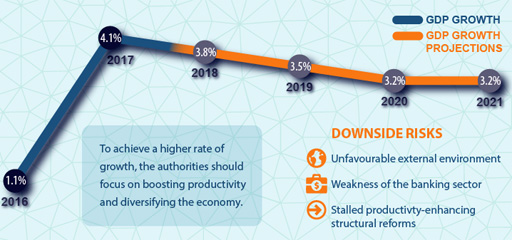Saturday 1 December 2018
Kazakhstan Must Rise to Challenge of Diversification, as Productivity Stagnates
Keywords: World Bank
ASTANA (World Bank press service) — Kazakhstan’s real gross domestic product (GDP) growth is projected at 3.8% for 2018 — down from 4.1% in 2017 — and to stabilize at around 3% in the medium term, according to the World Bank’s latest Kazakhstan Economic Update.
The Challenge of Economic Diversification amidst Productivity Stagnation attributes this GDP growth to a better-than-expected oil sector performance, steady pick-up in the services sectors and in agriculture. Despite these developments, however, Kazakhstan’s productivity growth has been in decline recently, curtailed by limited space for private sector growth and state dominance in the economy.

- World Bank Economic Update for Kazakhstan — Fall 2018
- Supported by robust oil production, the economy expanded at an annual rate of 4.1% in the first half of 2018, down slightly from a growth rate of 4.3% for the same period in 2017.
(Click to enlarge)
“Kazakhstan has initiated a series of reforms — including civil service reforms, fiscal decentralization, judicial modernization and measures to improve the business environment —in an attempt to address key structural weaknesses”, says Francis Ato Brown, World Bank Country Manager for Kazakhstan. “The implementation of these reforms could accelerate Kazakhstan’s transition toward a new growth model with a diversified and productive economy at its core.”
According to the report, household and public consumption in Kazakhstan remains weak. Going forward, household consumption is forecast to rise only modestly, on the back of recovering real incomes. Inflation eased to 5.3% in the year ending in October 2018, down from 7.7% in the same period in 2017, despite exchange rate volatility.
The special section of the Economic Update examines the decline in productivity of Kazakhstan’s economy.
“The economy of Kazakhstan is expected to perform better, thanks to the oil sector”, says Julio Revilla, World Bank lead economist for Central Asia. “However, analysis shows that productivity will be key for sustainable and long-term growth.”
Productivity growth in Kazakhstan has declined sharply in the past few years. After growing each year since the early 2000s and contributing up to 6% to GDP growth, the latest data shows that productivity declined by 2% per year between 2014 and 2016.
The decline in productivity is attributed largely to constraints imposed on private sector development, as reflected in low rates of business entry. In Kazakhstan, a handful of players—mostly state-owned enterprises - dominate key product markets. Empirical evidence suggests that newer, smaller firms are more productive than older, larger firms. However, because of the continued protection of inefficient, large firms, the exit of less productive firms is not taking place. This suggests that critical elements of Kazakhstan’s economic transition remain incomplete.
To improve productivity growth, the Economic Update makes several policy recommendations:
- Establish a regulatory environment that enables small and medium enterprises to emerge, grow, and attract FDI, and substantially reduce the state’s presence in the economy;
- Apply global best practices in reducing corruption and bolstering the rule of law to make companies in Kazakhstan more effective and adaptable;
- Implement competition and regulatory frameworks to ensure that privatization processes reduce concentration of market power, rather than simply transfer rents from the public sector to the private sector.

